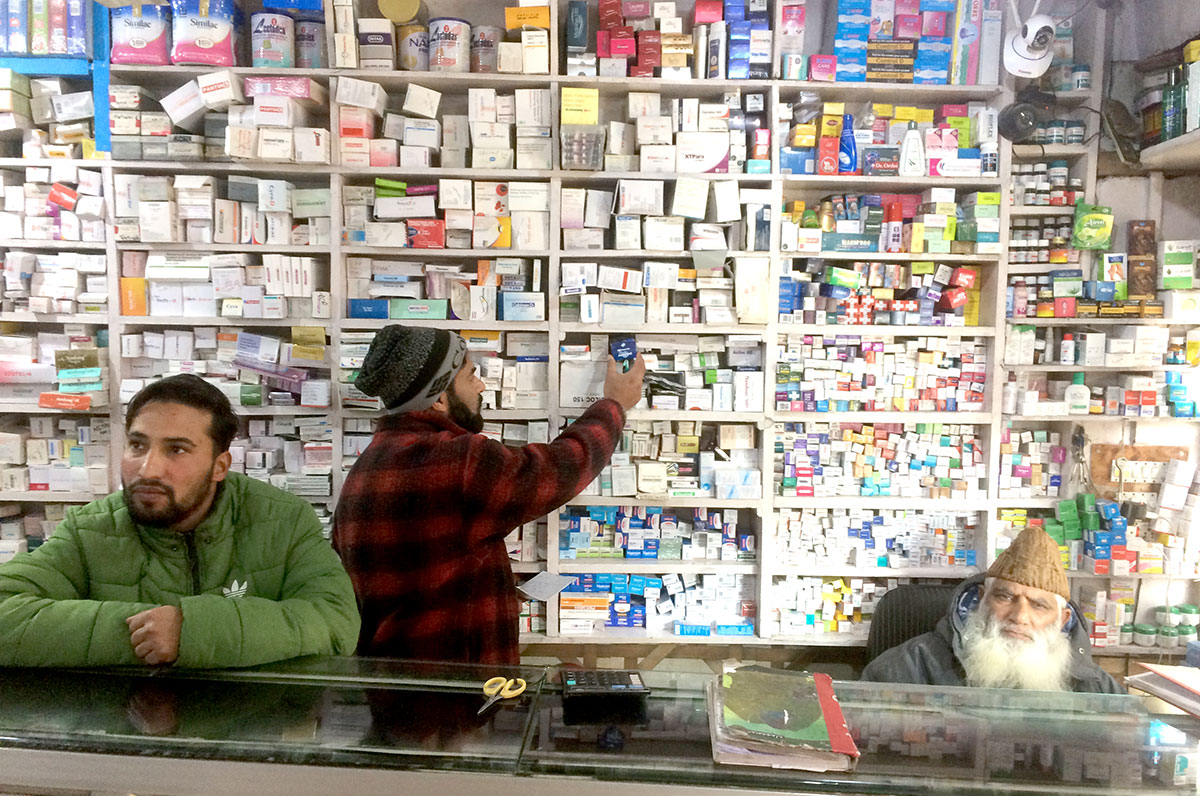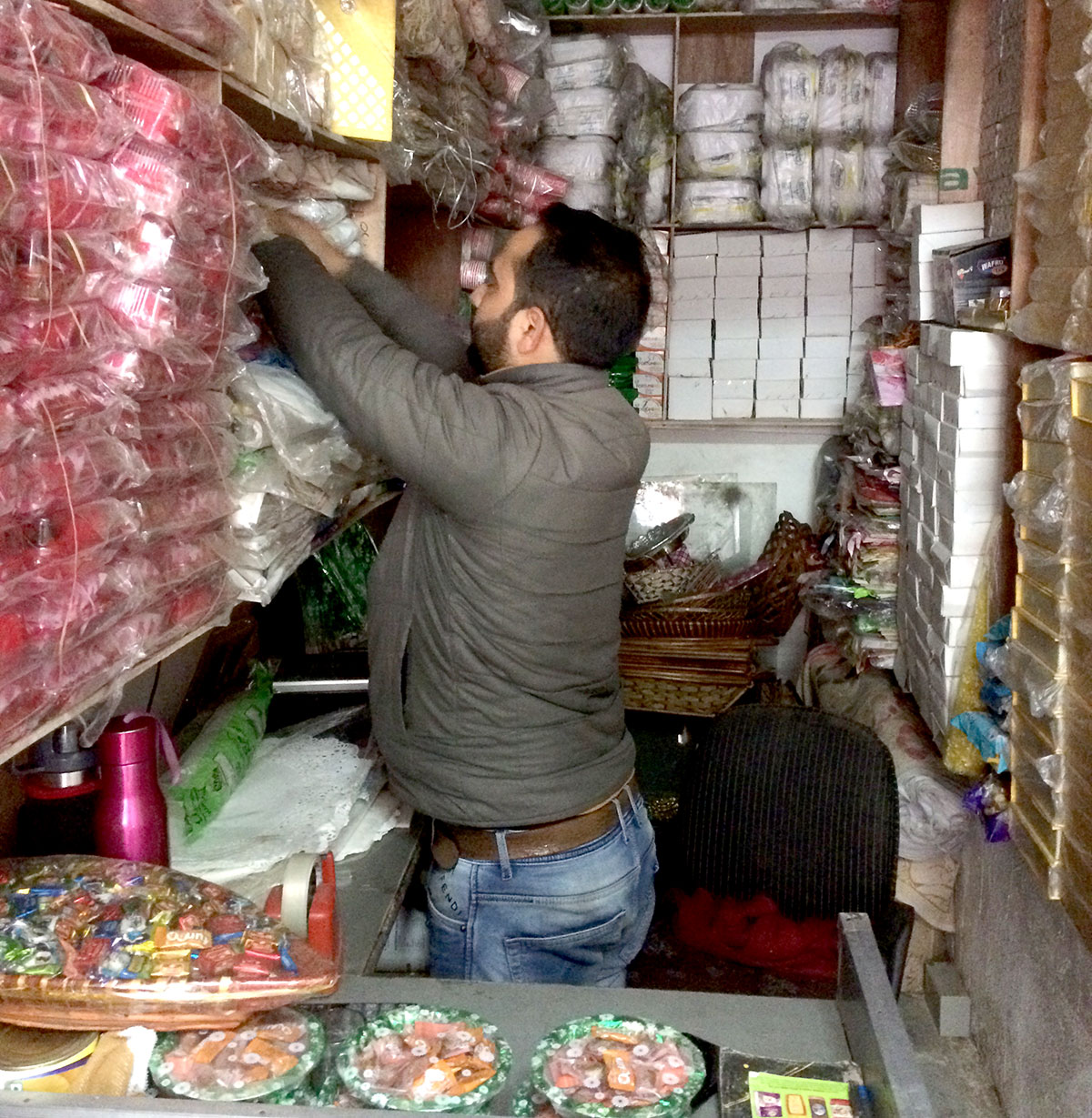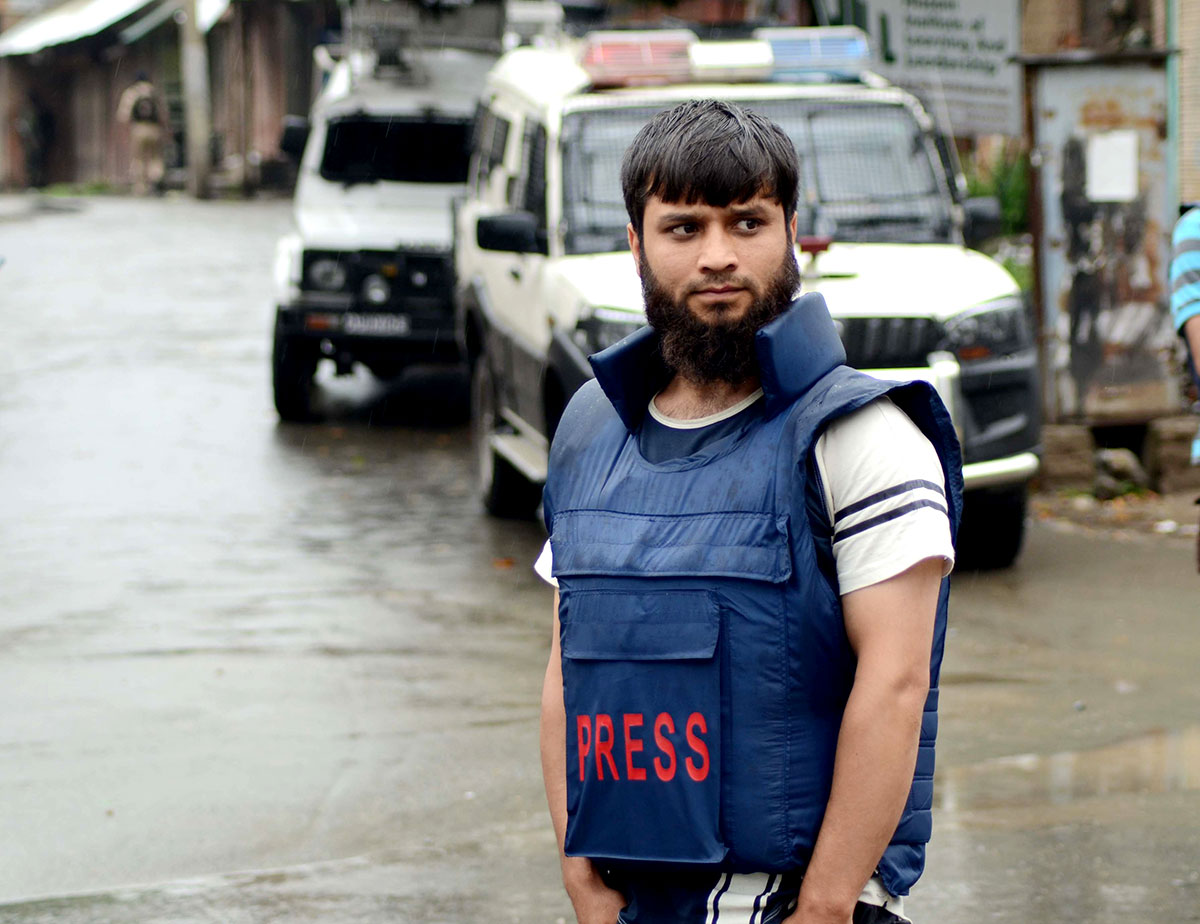The internet ban has taken a huge toll on Kashmir media, impacting the quality of journalism and making many journalists redundant as they fail to send their contributions to their media organisations. Unlike the scribes operating from Srinagar, the blockade proved deadly to the district reporters. Umar Khurshid met a group of scribes down south who were forced by the situation to hunt for alternative livelihoods including physical labour

On a cold December morning, a man wearing a striped woollen sweater and long boots walked down from a construction site in Anantnag’s Kadipora locality. Minutes later, a call from downstairs calling for lunch identified him as Muneeb-ul-Islam, a young freelance photojournalist, whose unique clicks have earned him appreciation worldwide.
Since internet services were suspended in Kashmir, Muneeb lost his job and was forced to look for an alternative. He started working as a daily-wage labourer. “I can’t express my you the sufferings I faced these days,” Muneeb said.
Eldest among his five siblings, Muneeb, 29, heads the family since his father’s death in 2015. “Overall responsibility of the family falls on my shoulders,” he said, regretting his choice of a profession. “Something more conventional should have given me a better income than this.”
Post-August 5, Muneeb has been working as a construction labourer to secure a living. In the last 100 or so, he has worked at various construction sites, in and around the town.
His problems, unfortunately, does not end here. Married a year back, Muneeb’s wife is expecting a baby, doubling his expenses. “A single visit to a doctor costs thousands,” said Muneeb. “Where will I get that money?”
Since August 5, Muneeb has not touched his camera as it gives him “a feeling of disappointment”. “I don’t want to leave my passion. But right now earning money matters more,” Muneeb said.

Famous among South Kashmir’s shutterbugs, some of Muneeb’s exclusive pictures have charmed the internet. “Besides conflict, I have covered culture, environment, faith, agriculture and many other stories for national and international organizations,” said Muneeb. Some of his photographs went viral on the net. “I would have still managed to capture life but I can’t send my pictures to anyone due to a lack of internet. At the Deputy Commissioner’s office — where the internet facility exists — there are many who are first among equals.”
Muneeb said his few years of work had got him some recognition at ground zero. “I did many photo stories about the problems people face in far-off villages. They still call me to cover their crisis,” Muneeb said. “They have given up their hope after watching me hold a shovel instead of a camera.”
Muneeb’s coverage of the October 21, 2018 blast at Laroo (Kulgam), in which seven civilians lost their lives, was acknowledged globally. His photographs were used by the TRT, The Quint, The Telegraph and many others locally.
Attempting to email some pictures, Muneeb was saddened when a “low-rung employee” at the DC office asked him to show the pictures he wished to mail. “It was shocking,” Muneeb said. “How could he judge my clicks when he knew nothing about journalism?”
It was then that he decided to become a salesman. The businesses were, however, booking huge losses and nobody would hire him. However, there was a lot of demand for manual labourers after the non-local construction labour had fled Kashmir, which is why he joined the flock and has since been working on construction sites. “Since August, I have started forgetting things deliberately,” he mused at the mid-day lunch break. “Otherwise, hunger will overtake my family.”
On the afternoon of November 26, a man with honey coloured eyes was holding a cup of tea in one hand and a mobile in the other, inquiring about the situation in Hakhoora village. Almost two hours back, the hamlet had seen a militant attack on an event related to Back to Village (B2V2), in which an agriculture department employee, Zahoor Ahmad, and a panch Syed Rafi, were killed.
Almost 15 minutes after the attack, reports came in, a group of nearby retailers barged into his shop, seeking further details. The man is neither a shopkeeper nor a gossiper, but a 35-year-old photojournalist, Mir Wasim, who had been covering Anantnag happenings for one of Kashmir’s leading daily newspapers for the last six years. Since August 5, however, Mir has not been in touch with anything related to media. “I’m just a helper at my uncle’s shop now,” Wasim said. “Nothing more than that.”
Wasim was providing visuals on a wide range of issues for his newspaper. “From 2013, till this August, I was getting a decent salary,” Wasim said. “However, the circumstances have changed and now I’m here.”
More than a month after the lockdown began, Wasim approached his uncle, seeking a job at his shop, located near the DC office. The store is under-sized and decorated with disposable items but its location is its strength. His maternal uncle knew his family well and did not refuse. “I leave home in the morning and come back in the evening,” Wasim said. “This is what I have been doing for last two months.”
Due to his earlier association with the media, people keep asking him about the current happenings. “But they have no knowledge of how badly the lack of internet has affected us,” Wasim said. “Some of my media associates have not earned a penny since August.”
Wasim has not, however, given up on photography. On his way to the shop, he captures random pictures and stores them on his laptop.
On November, 6, when season’s first snowfall triggered havoc in Kashmir’s apple belts, Wasim picked his bag and rushed to Shopian. “I clicked around five hundred pictures,” he remembers.
Barely few miles away from Wasim’s shop is a printing shop run by Bashir Ahmed, another journalist who took up a new job months back to cope with the expenses at home, but ended up with no ease.
Dusting a newly bought printing machine and the empty shelves of his undersized shop, Ahmad, 40, is sceptical if his store will ever be visited by customers.
Ahmad, the main town resident, had been working for a Delhi-based Urdu daily newspaper for the last 10 years. “I was the one responsible for overall J&K coverage for my newspaper,” Ahmad said. “But not anymore.”
After earning a postgraduate in Arabic from the Kashmir University, Ahmed joined Itlaat, a Srinagar-based Urdu newspaper in 2008, and worked there for one year. Later he joined Delhi-based news agency Asian Press News Service (APNS) where he has been working since December 2015. “I’m still staffed in the organization, but how would a reporter expect a salary without contributing to the organization?” he asked. His salary stopped coming in September. At one point of time, he even considered going to Delhi and working from there.
“My editors are convincing our managing editor to keep me on the rolls without a salary so that once internet is restored, I can resume working,” Ahmed informed. “But how long will they help me like this?”
As the situation got worse, Ahmad literally gave up on journalism and set up a publishing store where he prints brochures, advertising sheets and other texts, as per the orders.
Almost a kilometre away from Ahmed’s shop is the Help Line chemist store, outside District Hospital Anantnag, where Rehmani Sameer, 32, assists his elder brother in selling medicines.
A photojournalist with eleven years of experience, Sameer has worked with many national and local organizations. But ever since the internet services have been shutdown in Kashmir, Sameer is jobless.
For a few months, he survived on whatever little savings he had. As he faced the liquidity crunch, Sameer asked his elder brother to take him along to his pharmacy. “If the situation remains the same, I’ll have to change my profession permanently,” Sameer said. “If that happens, it will be involuntary, because my passion lies in photography.”
In 2006, soon after Sameer finished his post-graduation in Physics from the University of Kashmir, he bought a camera and began practicing photography at home.
A year later he realized he was passionate about photography. He shifted to Delhi where he completed a two-year diploma in journalism, specializing in camera techniques. Two years later, he approached a Delhi-based news magazine Sun News and began sending pictures from J&K. “I have covered conflict, environment, ecology, human rights and many other stories for the magazine,” Sameer said.
In 2010, he opted for another Delhi-based magazine for which he worked for two years but ended up working for a Srinagar-based English newspaper. “I have been working with the newspaper since 2012.”
Sameer said he would go with his passion but money matters more in such a trying situation. “It is better to look for a job that helps one earn his livelihood rather than to wait for something that is never going to happen,” he said.
Every morning, as Sameer leaves for his salesman job, he takes a round from Janglat Mandi to Lal Chowk to find any off-beat photograph. “Every day I click ten to twenty photographs and keep a record with me,” Sameer said.
Though he is not currently able to contribute to any organization, he never leaves home without his camera bag. He says he will retain his passion but might set up a separate pharmacy.
Naveed, a young reporter covering south-centric stories for one of the leading English dailies published from Srinagar, shares a similar story. He now works as a trainee at a local chemist shop. The store situated outside the district hospital belongs to one of his acquaintances from the Janglat Mandi locality. “After my organization stopped paying me, I decide to stop doing journalism for some time,” he sadly recollected. “I had no other options.”

A resident of Dialgam, not far away from the main town, Naveed has done an integrated degree in journalism and mass communication from Dehradun in 2015. A year later, Naveed took up a reporting job at Dehradun that honed his skills further, enabling him to join a newspaper in Srinagar. He had been contributing to a Srinagar-based newspaper ever since. “But now, with just one internet suspension order, my degree and experience have been rendered useless,” Said Naveed.
Pointing towards his framed degree certificate hanging on a nail in his room, Naveed giggled and said: “This is exactly what my situation is like. The internet restoration will decide my work now; if it is restored soon, I will get back to reporting, if not, I will change my profession permanently,” he adds sadly.
Rendered jobless by the situation, Naveed approached officials at the DC office and sought a few minutes of internet usage to pitch ideas to some Delhi-based media organizations. “Since then, I have kept my fingers crossed waiting for internet restoration,” Naveed said.
Tawseef Ahmed, 27, used to write for Delhi-based Hindi newspapers. Since the lockdown, he has been unable to report anything for Crime Vrodhi, a newspaper licensed under Delhi police, and no work means no pay. Tawseef, the erstwhile reporter, has now joined a food and spices business. “I thought it would help me to at least handle my own expenses,” Tawseef said.
On a cold November morning, Tawseef was busy clearing the windscreen of his car, leaving to collect the payment from different retailers belonging to different areas of the district.

Since the last two months, after Tawseef got a new job, he has been working alongside his elder brother Basharat Ahmed, 29. The brothers have a fixed seven-day schedule. “On the first day, we deliver orders, collect payment on the next day, return extra items on the third, and save the rest for random orders,” Tawseef explained how he spends his week.
Though Tawseef doesn’t earn a lot, he believes the earnings have made his life much easier. “If I had not joined a new business, I would have had no money at all,” he explained.
Asserting the fact that journalists in Kashmir have to depend on fewer earnings, Tawseef said that he faced many problems earlier as well. “But this time the crisis level has gone way too up, and so have the troubles,” he said.















